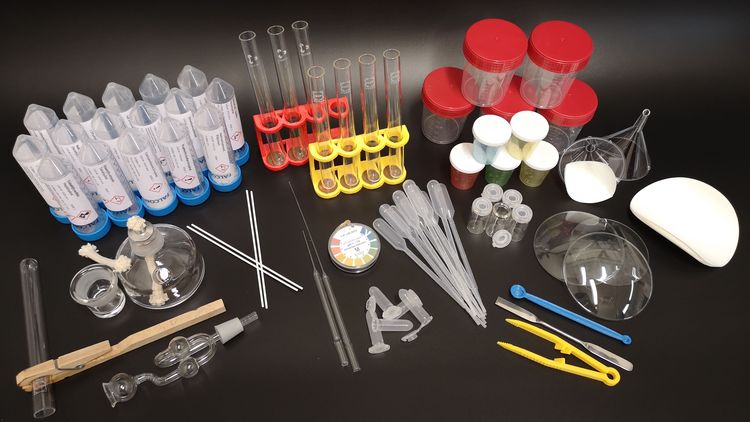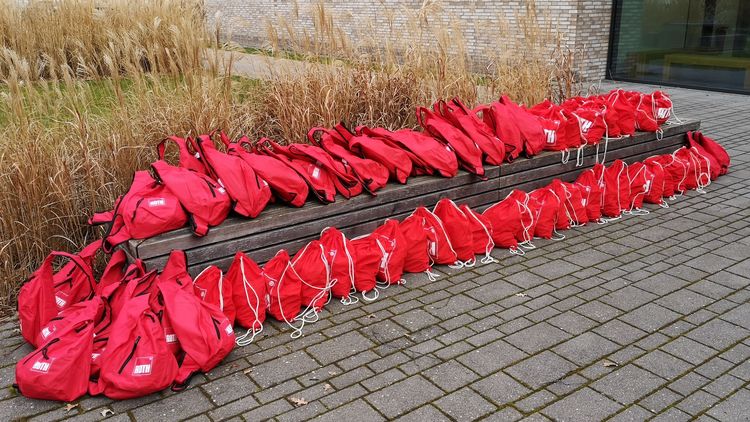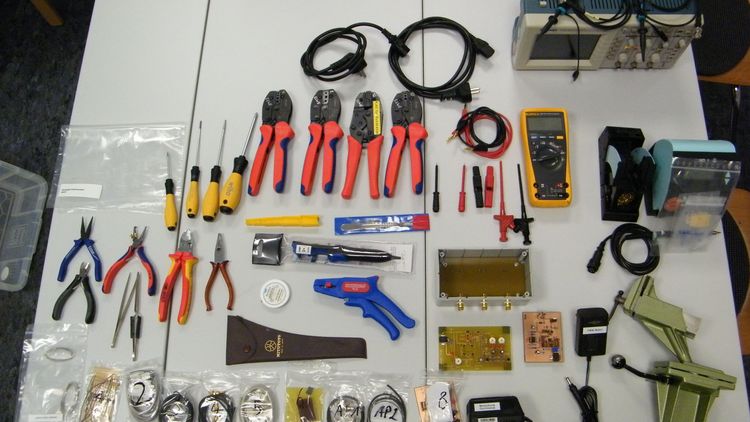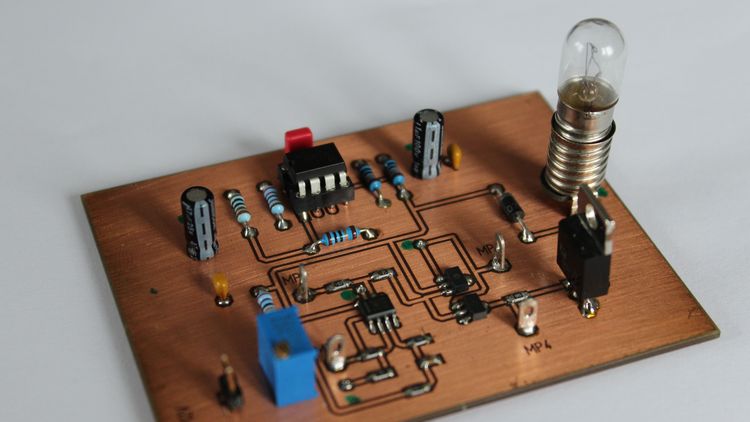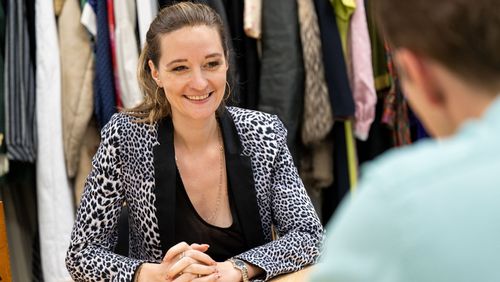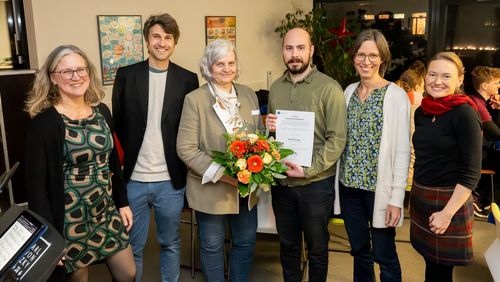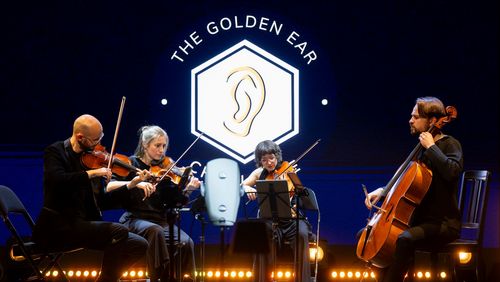University students don't just learn in lectures and seminars; they also study in the laboratory, in schools or in concert halls. In the last two semesters, practical training activities have often been cancelled, and there were many courses that could not be easily transferred to online formats. Much of the teaching in these areas took place in a different form than it normally would. "It has been impressive to see the commitment and creativity with which many teaching staff have implemented their courses despite the circumstances," says Dr. Simone Schipper, Head of Teaching and Learning at the Department for Study Affairs. The following six examples highlight what can be achieved despite Covid.
Chemistry: Experimental materials straight from the 3D printer
Forty-two red bags and rucksacks are neatly lined up outside the Experiments Lecture Hall complex on Wechloy Campus. It's mid-March, and over the next two weeks forty-two first-semester student teachers will take the block course Introduction to Laboratory Practices – at home. Dr Alexander Weiz, a lecturer and researcher in Professor Rüdiger Beckhaus's Inorganic Chemistry group, has packed each bag with all the things that participants will need for their experiments – equipment for filtering, for measuring pH values, for precipitation experiments and so on. Chemicals are also included, but Weiz and his team have selected only harmless substances that can be easily disposed of. The chemist manufactured the test tube stands, tweezers and spoon spatulas himself using the 3D printer and then had his student assistants do test-runs of all the experiments. Now the students can pick up their experiment kits. As far as Weiz is concerned, offering the course on a theory-only basis with video-recorded experiments was out of the question: "Studying chemistry without holding a test tube in your hand – that doesn't work," he explains.
Computer science: Makers' space at home
Cardboard, glue, straws and other everyday materials are the basic equipment for "rapid prototyping" – a process in which prototypes for a product are developed using simple means and methods. In the summer semester of 2020, each of the students taking the Makers' Lab module in the Computer Science and Engineering Socio-Technical Systems Master's degree programmes was provided with a boxful of utensils and given the task of designing a small wooden puzzle box that could be opened via a digitally controlled mechanism. Once the students had worked out and refined their concept, they received a second package containing electronic components. For work that needed to be done in the lab, such as 3D printing or laser cutting, they could contact the teaching team, who took care of that part for them. The results were excellent, says Professor Susanne Boll, who teaches Media Informatics at the University: "The students developed extraordinarily sophisticated, creative and fully functional puzzle boxes." Many said they enjoyed working in this flexible format and found it particularly productive.
Educational science: Nonviolent communication in daily life
One of the assignments for students in the Special Needs Education programme is all about nonviolent communication – a method used by educators to manage conflict situations in the classroom. "The conversation model is based on voicing your concerns without accusing the person you are talking to," explains Franziska Heinschke, a lecturer in the programme. In 2020, when it became impossible to put the theory into practice at schools, Heinschke told her students to try out the four steps of nonviolent communication in their daily lives – first with people they knew, then with strangers, for example at the supermarket checkout. "Looking back, this was a very good alternative," she says. The students could reflect on which situations they found the method useful for based on their own practical experience. Many of them made extensive use of the opportunity to practice the method on a voluntary basis, she notes: "It was very popular."
Music: Learning how to conduct without an ensemble
"An online course can't replace the experience of standing in front of a real ensemble," says Heidi Bayer, a jazz trumpeter and lecturer at the Institute of Music. But even so, with her course titled Ensemble Conducting: Popular Music II, over the last two semesters Bayer has found that conducting techniques can be practised effectively with the help of instructional videos and individual feedback – indeed, sometimes even more effectively than before. Since rehearsals with an ensemble were out of the question, Bayer provided her students with videos as visual learning aids. First, she selected pieces that were suited to the various techniques she teaches, then she filmed herself conducting. Once they had practised, the students made videos of their own attempts at conducting and received individual feedback. The positive results prompted Bayer to revise her whole concept: "Apparently it makes more sense to rehearse the basics of conducting first, before practising with the ensemble." In December, Bayer received the Teaching Award in the category Digitalization in University Teaching for her teaching concept.
Physics: A fun way to learn how to solder
An oscilloscope, a soldering iron and crimping pliers: Dr Thomas Madena and Jens Arne Jenn had a demanding task in mind when they put together a box of tools for their students last winter semester. In the experiment Electronics for Laboratory Work, physics students were given the task of building a circuit so they could learn key practical skills in the process. This time round, the experiment had to be conducted at home. "Most of them had seen someone soldering before, but had never done it themselves," says Madena, who heads the University's electronics workshop. The participants learned the necessary manual skills in online workshops and with the help of videos created by Jens Arne Jenn. Afterwards, the two lecturers provided students with assistance as needed via the video platform BigBlueButton. Many continued to work on their circuits even after the experiment itself had ended. But in the end, they had to hand back the equipment so that the next group could get started.
Biology: Out and about in nature
Inconspicuous plants such as grasses, ferns and horsetail plants are the subject of Botanical Identification Exercises, a course given by Dr Cord Peppler-Lisbach. But in the summer semester of 2020, rather than examining prepared specimens under the microscope in the seminar room, students were out and about in nature, exploring green areas and grass verges with their smart phone cameras in hand. They tracked down the plants they were looking for, photographed them and then recorded the identification process. "This meant that they spent much more time outdoors than in a normal semester and engaged more intensively with the habitats and natural environment of the plants," says Peppler-Lisbach. He also sees the instructional videos that students were able to watch whenever they wanted as another advantage of the new format. "This meant they were better prepared than in previous courses." Overall, he says, the course was a lot of fun for him and his assistants, as well as for the students – even though it also involved a lot of work for everyone.



